

Levels of participation. Communities of practice usually involve multiple levels of participation, as do most social learning spaces.
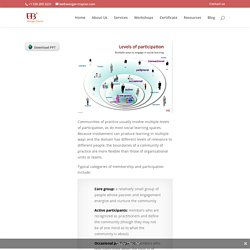
Planning and evaluating social learning. We talked about the new version of our framework in the last blog post.
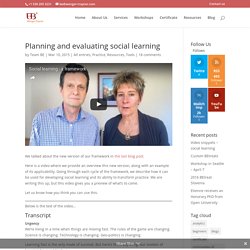
Here is a video where we provide an overview this new version, along with an example of its applicability. Going through each cycle of the framework, we describe how it can be used for developing social learning and its ability to transform practice. Planning and evaluating social learning. Lave and Wenger on Situated Learning Jean Lave and Etienne Wenger argue that learning is necessarily situated, a process of participation in communities of practice, and that newcomers join such communities via a process of ‘legitimate peripheral participation’—or learning by immersion in the new community and absorbing its modes of action and meaning as a part of the process of becoming a community member.
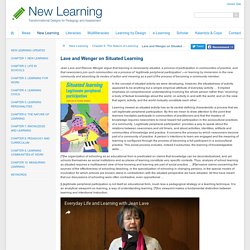
In the concept of situated activity we were developing, however, the situatedness of activity appeared to be anything but a simple empirical attribute of everyday activity … It implied emphasis on comprehensive understanding involving the whole person rather than ‘receiving’ a body of factual knowledge about the world; on activity in and with the world; and on the view that agent, activity, and the world mutually constitute each other … Learning viewed as situated activity has as its central defining characteristic a process that we call legitimate peripheral participation. Lave, Jean, and Etienne Wenger. 1991. The Systems Thinker – Communities of Practice: Learning as a Social System - The Systems Thinker. You are a claims processor working for a large insurance company.
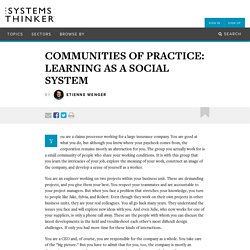
You are good at what you do, but although you know where your paycheck comes from, the corporation remains mostly an abstraction for you. The group you actually work for is a small community of people who share your working conditions. It is with this group that you learn the intricacies of your job, explore the meaning of your work, construct an image of the company, and develop a sense of yourself as a worker. You are an engineer working on two projects within your business unit. These are demanding projects, and you give them your best. You are a CEO and, of course, you are responsible for the company as a whole. We frequently say that people are an organization’s most important resource. EmeraldInsight. Advice about interviewing - JISCle2methods - Brookes Wiki.
Interviews are good for eliciting tacit understandings and to provide opportunity for students to reflect on what have been the important issues for them.
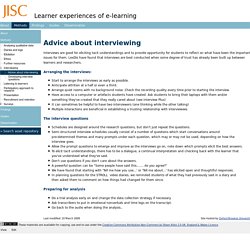
LexDis have found that interviews are best conducted when some degree of trust has already been built up between learners and researchers. Arranging the interviews: Start to arrange the interviews as early as possible. Developing interview questions - JISCle2methods - Brookes Wiki. Developing interview questions from research questions Means negotiating the difference between 'what we want to find out' and 'what the learner wants to tell us' language of researcher and language of learner a real conversation in which both sides are open to change Abstract questions lead to vague answers and impersonal generalisations Either start from, or quickly work towards, real incidents, artefacts and behaviours Seek examples to back up self-reports and stated opinions/beliefs Artefacts can be very powerful - make sure you can access them or ask learners to bring them along Artefacts learners have created, or events they initiated, are usually more revealing than materials or tasks determined by a tutor Tease out beliefs and feelings about the real incidents they offer.
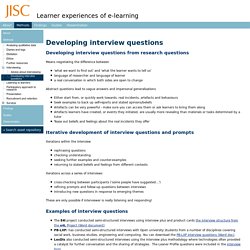
Interviewing - JISCle2methods - Brookes Wiki. Emotion in Social Media - Doctoral Dissertation by Galen Panger. The role of emotion in social media has been the subject of considerable research and media attention.
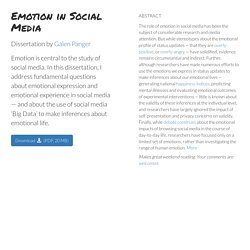
But while stereotypes about the emotional profile of status updates — that they are overly-positive, or overly-angry — have solidified, evidence remains circumstantial and indirect. Further, although researchers have made numerous efforts to use the emotions we express in status updates to make inferences about our emotional lives — generating national happiness indices, predicting mental illnesses and evaluating emotional outcomes of experimental interventions — little is known about the validity of these inferences at the individual level, and researchers have largely ignored the impact of self-presentation and privacy concerns on validity.
<nettime> Latour, Bruno: On Actor Network Theory: A few clarifications 1. Www.nettime.org Nettime mailing list archives [Date Prev] [Date Next] [Thread Prev] [Thread Next] [Date Index] [Thread Index]
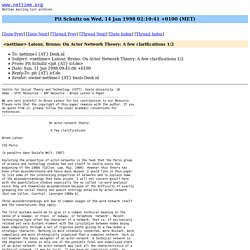
Actor–network theory - Wikipedia. Broadly speaking, ANT is a constructivist approach in that it avoids essentialist explanations of events or innovations (i.e.
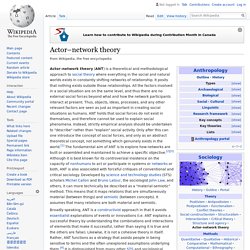
ANT explains a successful theory by understanding the combinations and interactions of elements that make it successful, rather than saying it is true and the others are false). Likewise, it is not a cohesive theory in itself. Rather, ANT functions as a strategy that assists people in being sensitive to terms and the often unexplored assumptions underlying them.[4] It is distinguished from many other STS and sociological network theories for its distinct material-semiotic approach. Working with Communities: Critical Perspectives. Amazon.co. A Handbook of Reflective and Experiential Learning: Theory and Practice - Jennifer A. Moon. Professor Chris Winch. Professor Chris Winch Professor of Educational Philosophy and Policy Contact information: Tel: +44 (0)20 7848 3152Fax: +44 (0)20 7848 3182Email: christopher.winch@kcl.ac.uk About me.
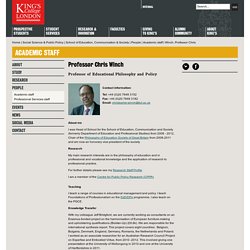
McKee Ch1. Ertmer 1999.
PDWHandout. An Error Occurred Setting Your User Cookie. An Error Occurred Setting Your User Cookie. 2011 Academia EARLI RdM. Assessing the value created through participating in a graduate studies community of practice. “Together we are better”: Professional learning networks for teachers. <div class="msgBox" style="margin-top:10px;"><span class="errMsg"><div>JavaScript is disabled on your browser. Please enable JavaScript to use all the features on this page. This page uses JavaScript to progressively load the article content as a user scrolls. Click the View full text link to bypass dynamically loaded article content. <a rel="nofollow" href=" full text</a></div></span></div><br /> a University of Massachusetts Amherst, Teacher Education & Curriculum Studies, 813 North Pleasant Street, Amherst, MA 01003-9308, USAb Texas Woman’s University, Teacher Education, P.O.
Received 30 October 2015, Revised 3 June 2016, Accepted 27 June 2016, Available online 2 July 2016. Professional Learning on Twitter: A content analysis of professio. 55c9febc08aea2d9bdcbf197. Learning in multiple communities from the perspective of knowledge capital. 1Hayriye Tugba Ozturk and 2Huseyin Ozcinar 1Ankara University, Turkey, 2Pamukkale University, Turkey Abstract In a learning system, multiple communities represent a networked structure of learning experiences. Individuals belong to multiple communities connected though complex relationships consisting of people, resources, rituals, and ties.
Learning occurs as individuals traverse this network from one community to the next. This paper explores the question of how learning occurs in compound communities from the perspective of knowledge capital, that is, the communities’ collective knowledge, skill, and perspective, as well as relationships and connections among members. McDonald Nagy Star Burch Cox Margetts LCJ 2012 AV. McDonald Nagy Star Burch Cox Margetts LCJ 2012 AV. 1 s2.0 S0742051X1630021X main. A Community of Practice for Knowledge Translation Trainees:... : Journal of Continuing Education in the Health Professions. A growing number of researchers and trainees identify knowledge translation (KT) as their field of study or practice.
Yet, KT educational and professional development opportunities and established KT networks remain relatively uncommon, making it challenging for trainees to develop the necessary skills, networks, and collaborations to optimally work in this area. How and what do academics learn through 20160301 5315 1fnj7h6. What's in a name TTTP accepted. EJ985432. 55dc91c108aed6a199adfccc. 390e4ce50f57081055eb8356b5e5ac59af23. An investigation into social learning activities by practitioners in open educational practices. Bieke Schreurs1, Antoine Van den Beemt1, Fleur Prinsen1, Gabi Witthaus2, Gráinne Conole2, and Maarten De Laat1 1Open Universiteit Nederland, 2University of Leicester, UK Abstract By investigating how educational practitioners participate in activities around open educational practices (OEP), this paper aims at contributing to an understanding of open practices and how these practitioners learn to use OEP.
Our research is guided by the following hypothesis: Different social configurations support a variety of social learning activities. The social configuration of OEPs is investigated by an operationalization into the dimensions (1) practice, (2) domain, (3) collective identity, and (4) organization. Social Learning Analytics Navigating the changing settings of HE final.
From-Top-to-Bottom-Investigating-the-Changing-Role-of-Hierarchy-in-Enterprise-Social-Networks. Technology for communities book chapter. 31 324 2 PB. Wenger Learning in a landscape of practice. Academic-toolkit. 14 11 21 WB report SADCOPAC EAAPAC. Strategic evaluation of network activities. Planning and evaluating social learning. Etd. Cultivating a Community of Practice. CoPChapterSchultz. Properties of Teacher Networks in Twitter: Are They Related to Community-Based Peer Production? Volume 18, Number 1. 02_bertram_ISCJ_2015-0049. Latent Dirichlet allocation - Wikipedia. ContentServer.asp-1. PROFESSIONAL LEARNING COMMUNITIES A REVIEW OF. Service co-creation in social media: An extension of the theory of planned. Into the Meta: Research Methods for Moving Beyond Social Media Surfacing: EBSCOhost. Evaluating the use of a social media tool for collaborative group writing o...: EBSCOhost.
Understanding link sharing tools continuance behavior in social media: EBSCOhost. Effects of social media usage and social media multitasking on the academic...: EBSCOhost. Investigating value creation in a community of practice with social network...: EBSCOhost. ContentServer. Bricolage - Wikipedia. In the arts, bricolage (French for "DIY" or "do-it-yourself projects") is the construction or creation of a work from a diverse range of things that happen to be available, or a work created by such a process. The term bricolage has also been used in many other fields, including philosophy, critical theory, education, computer software, and business.
Overview[edit] Di Domenico et al 2010 ETP Accepted published version open access 3. Tsaighosal. 568949b608ae051f9af758b4. British Library EThOS: Online value creation. This thesis is based on a related set of nine papers I published between 2004 and 2010. Six of these papers are sole authored and I was the lead author for the three joint authored papers. Four underlying themes are identified which underpin the research I have done. Firstly, market entry through the dot com model which was covered in my first published paper (Laffey, 2004).
British Library EThOS: Online value creation.